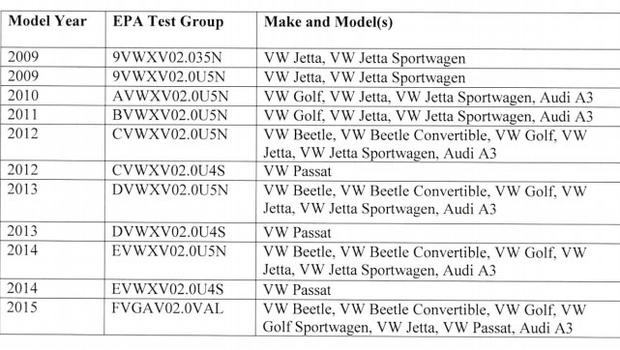Volkswagen's stock is a car wreck
Volkswagen -- which faces stiff penalties for rigging its diesel cars to pass U.S. air pollution tests -- got a more immediate smack on Monday, losing more than $17 billion, or nearly a quarter of its market value.
Shares of the German car manufacturer closed at a more than three-year low in Frankfurt, a day after Martin Winterkorn, Volkswagen's chief executive, apologized, saying the company would cooperate with U.S. agencies and would also conduct an internal probe.
As first reported by Bloomberg News, CBS News has learned the U.S. Justice Department is conducting a criminal probe of Volkswagen's conduct in what could test the department's promise to hold individuals accountable for corporate criminal conduct.
Given the unanswered questions, which include whether Volkswagen engaged in similar conduct in Europe, where diesel cars are far more popular, there's little reason to think the stock's plunge won't continue, said one market analyst.
"The question is, is it only in the U.S., or is it also happening in Europe?" Klaus Breitenbach, an analyst at Baader Helvea Equity Research, told CBS MoneyWatch.
"It is premature to comment on whether any specific immediate surveillance measures are also necessary in Europe and whether vehicles sold by Volkswagen in Europe are also affected," Lucia Caudet, a spokesperson for the European Commission, emailed. "We are also in contact with the U.S. Environmental Protection Agency (EPA) and the California Air Resources Board (CARB) to learn more about the facts behind their decision."
While the EPA has said Volkswagen faces up to $18 billion in fines, Breitenbach believes the penalties ultimately assessed will be below that figure, and the greater hit will be to the company's reputation.
"Why would you do this is another question," Breitenbach said. On the face of it, Volkswagen made a large gamble for relatively small stakes, given the company's U.S. sales account for only 6 percent of its global volume, and of the roughly 600,000 cars sold in the U.S. last year, just 120,000 to 150,000 were diesel.
One attorney now involved in litigation against Volkswagen likens the case to Hyundai Motor America and Kia Motors America, which in late 2013 agreed to pay $400 million for inflating the fuel economy claims for their vehicles.
"My theory is as they (Volkswagen) were developing the car, it did not perform as they wanted it too, but it was too late in the manufacturing process," Steve Berman, managing partner at Hagens Berman Sobol Shapiro, told CBS MoneyWatch. "It is something similar to Hyundai, where I believe they were planning on advertising 40 miles a gallon, realized they committed to that, so they went ahead."
California, where roughly a tenth, or about 50,000, of the roughly half a million 4-cylinder Volkswagen and Audi diesel passenger cars have sold in the United States since 2009, is working to address the immediate concern of cutting the vehicles' emissions of the pollutant nitrogen oxide, which contribute to ozone and smog, both contributors to asthma attacks and other respiratory diseases.
"We're continuing to move forward with Volkswagen to develop an approach to ensure these vehicles come into compliance, because we want to keep our air clean, and we'll be taking appropriate enforcement action, so it's a two-pronged process," Stanley Young, CARB's communications director, said.
Beyond state or federal penalties, Volkswagen also faces the prospect of class-action suits filed on behalf of consumers.
"I believe it will be the largest car class action in U.S. history, and I say that as the one who settled the largest one so far," Berman said, referring to a case where his firm represented plaintiffs in a class-action suit against Toyota. The carmaker paid $1.6 billion to compensate vehicle owners for financial losses incurred from reports of sudden and unintentional acceleration in 2009 and 2010.
Vehicles listed by the Environmental Protection Agency as impacted are identified in the table below:
"It's the most overwhelming response to a class-action lawsuit I've ever had," Berman said of the more than 800 people from 28 states had signed on as plaintiffs in the case against Volkswagen.
Consumers who purchased diesel-run cars from Volkswagen paid a premium of $1,000 to $7,000, depending on the model, because they believed they "thought they were buying a clean diesel," Berman said.
Additionally, part of the appeal of the cars is fuel efficiency, which might be reduced once Volkswagen changes the software that had been programmed to allow for the vehicles to pass emissions tests, only to then spew above the allowable levels of pollutants when on the road.
"We'll have to see what happens to the performance when they fix the cars," Berman said. If it's degraded, I think people are going to be demanding a full refund."
BMW, which declined comment on Volkswagen's troubles, said it sold 8,472 diesel models in the U.S. from the start of the year through the end of August, or 3.8 percent of its overall vehicle sales in this country, Kenn Sparks, a spokesperson for BMW of North America, emailed.
Volkswagen, which on Friday said it was cooperating with U.S. investigators, declined further comment on Monday.
